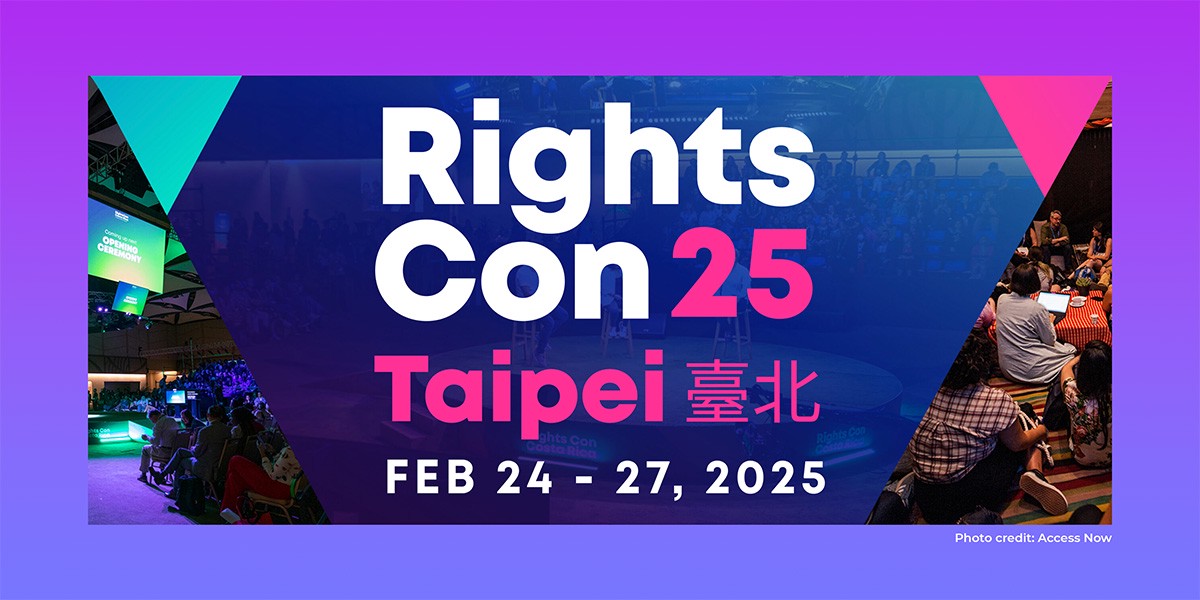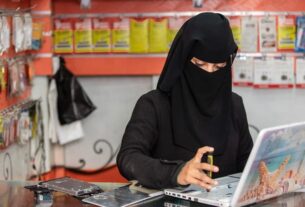EFF is delighted to be attending RightsCon again—this year hosted in Taipei, Taiwan between 24-27 February.
RightsCon provides an opportunity for human rights experts, technologists, activists, and government representatives to discuss pressing human rights challenges and their potential solutions.
Many EFFers are heading to Taipei and will be actively participating in this year’s event. Several members will be leading sessions, speaking on panels, and be available for networking.
Our delegation includes:
- Alexis Hancock, Director of Engineering, Certbot
- Babette Ngene, Public Interest Technology Director
- Christoph Schmon, International Policy Director
- Cindy Cohn, Executive Director
- Daly Barnett, Senior Staff Technologist
- David Greene, Senior Staff Attorney and Civil Liberties Director
- Jillian York, Director of International Freedom of Expression
- Karen Gullo, Senior Writer for Free Speech and Privacy
- Paige Collings, Senior Speech and Privacy Activist
- Svea Windwehr, Assistant Director of EU Policy
- Veridiana Alimonti, Associate Director For Latin American Policy
We hope you’ll have the opportunity to connect with us during the conference, especially at the following sessions:
Day 0 (Monday 24 February)
Mutual Support: Amplifying the Voices of Digital Rights Defenders in Taiwan and East Asia
09:00 – 12:30, Room 101C
Alexis Hancock, Director of Engineering, Certbot
Host institutions: Open Culture Foundation, Odditysay Labs, Citizen Congress Watch and FLAME
This event aims to present Taiwan and East Asia’s digital rights landscape, highlighting current challenges faced by digital rights defenders and fostering resonance with participants’ experiences. Join to engage in insightful discussions, learn from Taiwan’s tech community and civil society, and contribute to the global dialogue on these pressing issues. The form to register is here.
Platform accountability in crisis? Global perspective on platform accountability frameworks
09:00 – 13:00, Room 202A
Christoph Schmon, International Policy Director; Babette Ngene, Public Interest Technology Director
Host institutions: Electronic Frontier Foundation (EFF), Access Now
This high level panel will reflect on alarming developments in platforms’ content policies and their enforcement, and discuss whether existing frameworks offer meaningful tools to counter the current platform accountability crisis. The starting point for the discussion will be Access Now’s recently launched report Platform accountability: a rule-of-law checklist for policymakers. The panel will be followed by a workshop, dedicated to the “Draft Viennese Principles for Embedding Global Considerations into Human-Rights-Centred DSA enforcement”. Facilitated by the DSA Human Rights Alliance, the workshop will provide a safe space for civil society organisations to strategize and discuss necessary elements of a human rights based approach to platform governance.
Day 1 (Tuesday 25 February)
Criminalization of Tor in Ola Bini’s case? Lessons for digital experts in the Global South
09:00 – 10:00 (online)
Veridiana Alimonti, Associate Director For Latin American Policy
Host institutions: Access Now, Centro de Autonomía Digital (CAD), Observation Mission of the Ola Bini Case, Tor Project
This session will analyze how the use of Tor is criminalized in Ola Bini´s case and its implications for digital experts in other contexts of criminalization in the Global South, especially when they defend human rights online. Participants will work through various exercises to: 1- Analyze, from a technical perspective, the judicial criminalization of Tor in Ola Bini´s case, and 2- Collectively analyze how its criminalization can affect (judicially) the work of digital experts from the Global South and discuss possible support alternatives.
The counter-surveillance supply chain
11:30am – 12:30, Room 201F
Babette Ngene, Public Interest Technology Director
Host institution: Meta
The fight against surveillance and other malicious cyber adversaries is a whole-of-society problem, requiring international norms and policies, in-depth research, platform-level defenses, investigation, and detection. This dialogue focuses on the critical first link in this counter-surveillance supply chain; the on the ground organizations around the world who are the first contact for local activists and organizations dealing with targeted malware, and will include an open discussion on how to improve the global response to surveillance and surveillance-for-hire actors through a lens of local contextual knowledge and information sharing.
Day 3 (Wednesday 26 February)
Derecho a no ser objeto de decisiones automatizadas: desafíos y regulaciones en el sector judicial
16:30 – 17:30, Room 101C
Veridiana Alimonti, Associate Director For Latin American Policy
Host institutions: Hiperderecho, Red en Defensa de los Derechos Digitales, Instituto Panamericano de Derecho y Tecnología
A través de este panel se analizarán casos específicos de México, Perú y Colombia para comprender las implicaciones éticas y jurídicas del uso de la inteligencia artificial en la redacción y motivación de sentencias judiciales. Con este diálogo se busca abordar el derecho a no ser objeto de decisiones automatizadas y las implicaciones éticas y jurídicas sobre la automatización de sentencias judiciales. Algunas herramientas pueden reproducir o amplificar estereotipos discriminatorios, además de posibles violaciones a los derechos de privacidad y protección de datos personales, entre otros.
Prying Open the Age-Gate: Crafting a Human Rights Statement Against Age Verification Mandates
16:30 – 17:30, Room 401
David Greene, Senior Staff Attorney and Civil Liberties Director
Host institutions: Electronic Frontier Foundation (EFF), Open Net, Software Freedom Law Centre, EDRi
The session will engage participants in considering the issues and seeding the drafting of a global human rights statement on online age verification mandates. After a background presentation on various global legal models to challenge such mandates (with the facilitators representing Asia, Africa, Europe, US), participants will be encouraged to submit written inputs (that will be read during the session) and contribute to a discussion. This will be the start of an ongoing effort that will extend beyond RightsCon with the goal of producing a human rights statement that will be shared and endorsed broadly.
Day 4 (Thursday 27 February)
Let’s talk about the elephant in the room: transnational policing and human rights
10:15 – 11:15, Room 201B
Veridiana Alimonti, Associate Director For Latin American Policy
Host institutions: Citizen Lab, Munk School of Global Affairs & Public Policy, University of Toronto
This dialogue focuses on growing trends surrounding transnational policing, which pose new and evolving challenges to international human rights. The session will distill emergent themes, with focal points including expanding informal and formal transnational cooperation and data-sharing frameworks at regional and international levels, the evolving role of borders in the development of investigative methods, and the proliferation of new surveillance technologies including mercenary spyware and AI-driven systems.
Queer over fear: cross-regional strategies and community resistance for LGBTQ+ activists fighting against digital authoritarianism
11:30 – 12:30, Room 101D
Paige Collings, Senior Speech and Privacy Activist
Host institutions: Access Now, Electronic Frontier Foundation (EFF), De|Center, Fight for the Future
The rise of the international anti-gender movement has seen authorities pass anti-LGBTQ+ legislation that has made the stakes of survival even higher for sexual and gender minorities. This workshop will bring together LGBTQ+ activists from Africa, the Middle East, Eastern Europe, Central Asia and the United States to exchange ideas for advocacy and liberation from the policies, practices and directives deployed by states to restrict LGBTQ+ rights, as well as how these actions impact LGBTQ+ people—online and offline—particularly in regards to online organizing, protest and movement building.



